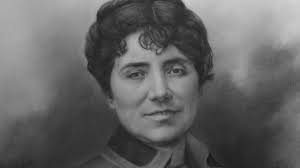Hi everyone,
We propose a research about the most outstanding modern female writer in the Galician
language: ROSALÍA DE CASTRO
-Who was this woman?
- What literary movement did she belong to? Can we find something similar in your literary
tradition of that period?
- Why was she so important for Galician language and culture?
- When do we commemorate her?
To complete the challenge, could you unscramble these verses she
wrote? They are from one of her most famous poems.
When you get it, what about reading them aloud and record it?
Good luck!!! 🍀🍀
penso / negra / ó/ facéndome / cabezales / que / pé /
tornas / me / cando / te / sombra / fuches / que /
asombras / sombra / dos / mofa / meus / tornas
ida / amostras / i / vento / cando / que / brila / eres /
sol/ a / maxino / no / me / zoa / i / que / estrela / es /
que /mesmo / te / eres / que / o

- This woman (as you've written before) was the most outstanding modern female writer in the Galician. She was also the national poet of Spain.
ReplyDelete- She belonged to the Galician
Rexurdimento(renaissance), a romanticist literary movement that promotes the use of the Galician Language for foster a uniquely Galician tradition. In our literary tradition of that period the most popular writer was Jan Kochanowski. He was the first one to starting writing poetry in the correct Polish which have a lot of fancy words.
- She was so important for Galician language and culture because she was the first or one of the first people who had been writing in Galician. She had been writing in Galician although some people recognized Galician as a spanish dialect which had been made ,,only for the illiterate and the churlish." Thanks to the attitude she gained her fame.
- We commemorate her on a Galician Literaturę Day on the 17th of May each year.
We're sorry if some of those information aren't true but it was hard to find them because the woman wasn't as popular in Poland as she was in Spain.
And the verses of her poem are:
Cando penso que te fuches
Negra sombra que me asombras
ó pé dos meus cabezales
Tornas facéndome mofa
Cando maxino que es ida
No mesmo sol te me amostras
I eres a estrela que brila
I eres o vento que zoa
And the words that aren't match in our geuss are: sombra, que, tornas, sombra
Great!!!! It was a tricky challenge but you have solved it very well. Congrats!!! All your answers are ok and quite precise.
ReplyDeleteWe hope you have enjoyed it!! Thanks for sharing!
This is a link to the musical version of the poem.
https://www.youtube.com/watch?v=gdnVZE5I8Os